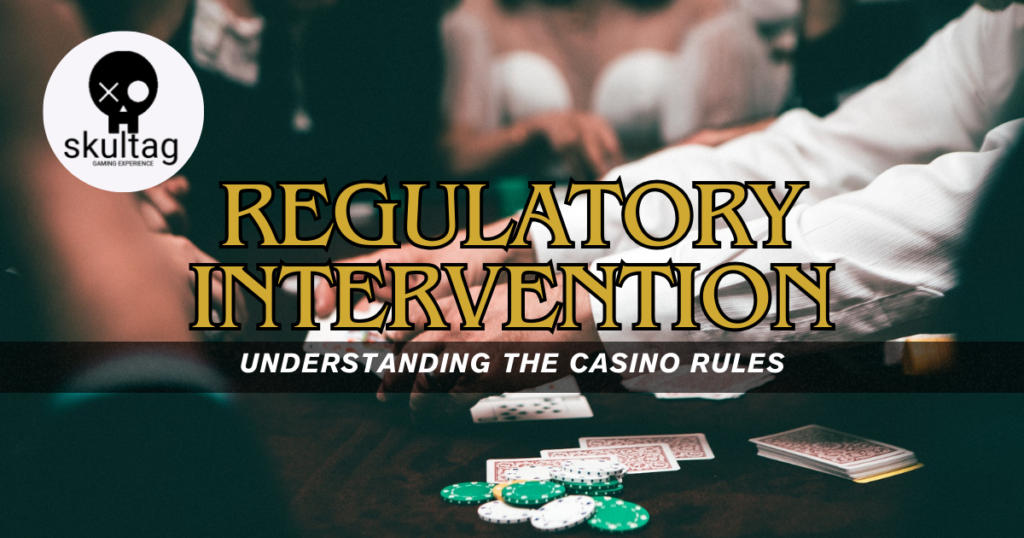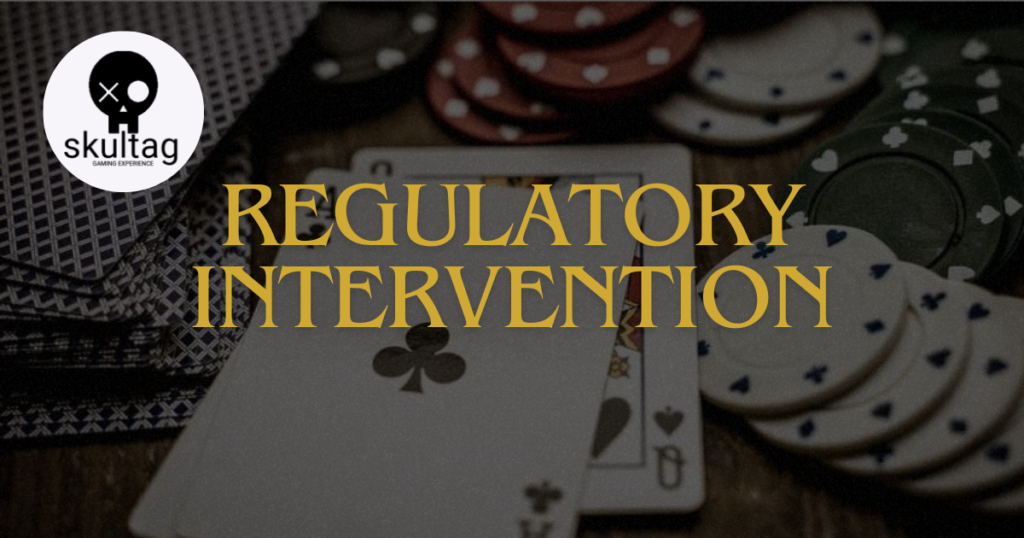Casinos must adhere to regulations set by various governments and jurisdictions. By following these steps, they ensure compliance with the diverse regulatory requirements across different countries, thereby maintaining the legality and integrity of their business operations and minimizing the risk of regulatory intervention. Explore how SkullTag aligns with these crucial regulatory standards to provide a secure and trustworthy gaming environment.
Table of Contents
Introduction
Welcome to our global casino regulations guide! Whether you’re a seasoned operator or new to the industry, navigating these rules can be tough.
But fear not! In this guide, we’ll outline the crucial steps to ensure compliance with regulations across various countries, fostering a safe and fair gaming environment.
By the end, you’ll grasp how to adhere to worldwide casino regulations, enabling smoother and more ethical operations, while also mitigating the risk of regulatory intervention and fostering player trust.
Understanding the Casino Rules

Before delving into specifics, it’s crucial to grasp the regulations casinos must adhere to. These rules vary across different regions, posing challenges for compliance.
However, by dissecting these regulations into manageable components, we can enhance our understanding and adherence, ensuring compliance regardless of our casino’s location and minimizing the risk of regulatory intervention.
Why Does Compliance Matter?
In the casino industry, compliance is vital to ensure fairness, legality, and player protection. Casinos must follow numerous rules and regulations to avoid hefty fines, legal issues, and damage to their reputation.
By adhering to these rules, casinos establish trust with players, regulators, and financial institutions, fostering a safe gaming environment.
Consumer protection is a key aspect of compliance. Casinos must prioritize patron safety by following regulations that safeguard consumer rights and interests.
This involves implementing measures to prevent problem gambling, ensuring fair play, and safeguarding sensitive customer data against regulatory intervention.
Key Steps for Compliance
To ensure compliance with international regulations, casinos can take several key steps:
Research and Understanding
Casinos should conduct thorough market exercises and research to understand the regulations applicable to their operations. This includes familiarizing themselves with gambling laws, anti-money laundering requirements, and related consumer protection regulations to minimize the risk of regulatory intervention.
Internal Policies and Procedures
Establishing internal policies and procedures is essential for ensuring compliance with administrative law. Casinos should develop clear guidelines for staff to follow, covering areas of administrative law, such as responsible gaming practices, customer identification procedures, and data protection measures, to minimize the risk of regulatory intervention.
Training and Education
Proper training and education for casino staff and management are crucial for maintaining compliance with regulations. Staff and management should receive regular training on relevant regulations and protocols to ensure they understand their responsibilities and can effectively implement compliance measures.
Utilizing Technology
Technology and services can be a valuable tool for enhancing compliance efforts. Casinos can use these services and software solutions for tasks such as monitoring transactions, verifying customer identities, and implementing cybersecurity measures to protect sensitive consumer protection data.
Building Relationships with Regulators
Establishing positive relationships with regulatory intervention and enforcement authorities is essential for staying informed about regulatory intervention developments and seeking guidance on compliance matters. Casinos should actively engage with regulators, participate in industry forums, give resources, and maintain open communication channels.
Steps for Success
Now, let’s look at the important things banks and casinos need banks to do to follow rules and regulations to succeed in the global casino industry market.
Creating Rules to Follow
The first step in ensuring compliance with regulation is to establish clear and concise rules for your casino. These rules should outline the dos and don’ts for both staff and players, covering important aspects such as responsible gaming practices, customer identification procedures, and data protection measures.
By creating robust internal policies and procedures, you demonstrate your commitment to upholding regulatory intervention standards and fostering transparency within your organization.
Training Your Staff
Once you establish rules, it’s crucial to ensure your team understands and follows them. Regular training sessions help keep your staff updated on international rules. These sessions cover spotting risks, handling regulators, and maintaining a safe gaming environment by following the rules.
Using Technology
Technology can be a valuable ally in your quest for compliance. Leveraging advanced software solutions can streamline compliance processes and enhance security measures.
For example, you can implement anti-money laundering (AML) and know-your-customer (KYC) software for automated monitoring of transactions and customer identification.
Additionally, investing in cybersecurity measures such as encryption and firewalls can safeguard sensitive data from cyber threats.
Building Relationships
Building good relationships with regulators and industry peers is key for staying informed about rules and best practices. Joining industry groups, going to conferences, and talking openly with regulators can keep you updated and help you adjust to changes. By being committed to following rules and working with others, you can gain trust and respect in the industry and with regulators. This helps boost your casino’s reputation and success while reducing the chance of regulatory issues.
Spotting Rule Challenges
Every casino faces unique regulatory intervention challenges, depending on its location and operating environment. It’s essential to recognize and address these challenges proactively to mitigate compliance risks and maintain regulatory intervention compliance. Stay updated on gambling laws, anti-money laundering regulations, and data protection requirements to ensure that your casino remains compliant with relevant regulations.
By conducting thorough quality risk assessments before production and consumption and implementing appropriate quality control measures during production and consumption, you can minimize the likelihood of regulatory intervention or court intervention for quality, and protect consumers of your casino from potential adverse effects during production and consumption.
Setting Up Rules
Creating clear and easy-to-follow compliance policies for your casino is crucial to meeting regulatory standards. By setting strict rules and holding everyone accountable, you show your commitment to transparency.
Ensure that these rules are clear, easy to understand, and consistently followed throughout your casino. By promoting a culture of compliance and responsibility, you build trust among stakeholders and improve your casino’s integrity.
Creating Rules to Follow
Ensuring that casino staff are well-trained in regulatory compliance is essential for maintaining a safe and secure gaming environment. Let’s delve deeper into why staff training is crucial and how it in practice can be effectively implemented.
Why Staff Training Matters?
Training staff in casino compliance is vital for keeping the gaming environment safe. Here’s why it matters and how it’s done.
Imagine a casino where employees aren’t familiar with the rules. This increases the risk of not following the law, leading to fines, legal issues, and damage to the casino’s reputation.
To prevent these problems, casino operators can offer thorough training. This helps create a culture of compliance, where employees understand the rules and know how to follow them, reducing the chances of regulatory intervention.
Key Components of Staff Training
- Understanding Rules: Staff learn about gambling laws, money laundering rules, and data protection.
- Applying Rules: Through exercises and case studies, staff practice following rules in real situations.
- Knowing Consequences: Staff learns the outcomes of breaking rules, like fines or losing the casino’s license.
- Continuous Learning: Training isn’t a one-time thing. Casinos should keep staff updated on new rules and risks.
Implementing Effective Training Programs
- Customize Training: Tailor programs for different roles, like gaming floor staff or managers.
- Use Various Methods: Offer workshops, online courses, and written materials to fit different learning styles.
- Provide Feedback: Give staff regular feedback to help them improve.
- Encourage Communication: Create a culture where staff can ask questions and report concerns.
Using Technology
In today’s digital age, technology is vital for helping casinos follow the rules and keep their operations safe and secure. Let’s explore how casinos can use technology to ensure compliance with regulations.
Monitoring Transactions Automatically
Technology allows casinos to track financial transactions automatically. Specialized software can analyze transactions in real-time to detect any suspicious activity that might indicate illegal actions like money laundering. This helps casinos spot potential issues early and avoid problems with regulators.
Strengthening Cybersecurity
Casinos must protect sensitive data from cyber threats. They can use encryption and firewall technologies to keep access and safeguard financial and personal information from hackers. By investing in cybersecurity, casinos can keep data safe and show their commitment to customer privacy.
Using Compliance Management Software
Specialized software helps casinos manage compliance tasks efficiently. It includes features like document management and compliance reporting, making it easier to follow the rules and keep track of regulatory intervention changes.
Analyzing Data
Data analytics tools help casinos identify trends and patterns that might indicate compliance issues. By analyzing transaction data and customer behavior, casinos can improve their operations, generate more revenue, and demonstrate compliance to regulators, reducing the risk of regulatory intervention.
Continuous Improvement
Technology enables casinos to continuously monitor and improve their compliance efforts. They can set up automated monitoring systems and conduct regular audits to spot and fix compliance gaps.
Building Relationships
Connect with regulators and industry peers to stay updated on rules and best practices. Join groups, attend events, and engage with regulators.
Demonstrating commitment to quality production and rule adherence builds market trust and fosters collaboration with regulators and industry peers on regulatory intervention and enforcement matters, minimizing potential issues.
Knowing Global Rules
Learn about international rules set by organizations like the Financial Action Task Force (FATF) and the European Union. Understanding these rules helps you adjust your compliance plans to meet global standards.
Spotting Rule Challenges
Notice and tackle the special rule challenges and regulatory intervention that casinos face in different places. Stay updated on gambling laws and regulations, anti-money laundering rules, and data protection requirements to prevent problems and follow the rules.
Setting Up Rules
Make simple rules for your casino that fit what you do. Use strong control measures and ways to make sure everyone follows the rules.
This shows you’re serious about following regulations and being clear with consumers about how your casino works.
Conclusion
Great job! You’ve mastered the seven crucial steps to navigate the rules of the global casino industry. By adhering to these steps, you’ll ensure your casino operates within the law and upholds high standards of integrity.
Compliance with regulations goes beyond avoiding trouble—it’s about fostering trust and honesty in gaming. When players have confidence in your casino, they’ll enjoy a superior gaming experience.
However, our commitment to regulation doesn’t stop here. Compliance is an ongoing journey that demands continuous attention and dedication. It’s essential to stay informed about regulatory changes and adapt your strategies accordingly. By being proactive, you can keep your casino compliant and thriving amidst the evolving landscape of the gaming industry, minimizing the risk of regulatory intervention.
FAQs (Frequently Asked Questions) about Regulatory Intervention
What are Global Rules?
International rules are guidelines set by worldwide governments and local groups to control and oversee the casino industry. These rules cover things like gambling laws, anti-money laundering rules, and consumer protection.
Why Following Rules is Important?
Casinos must follow rules to stay in business, and legal, keep games fair, and protect consumers and players. If they fail to act and don’t follow rules, they can get fined a lot, face legal problems, fail, and harm consumers and their reputation.
How Technology Aids Compliance?
Technology is crucial for helping firms such as banks and casinos follow rules. It helps firms to track transactions, identify customers, and keep sensitive data safe from cyber threats.
How can casino operators build strong relationships with governments and regulatory authorities?
Casino operators can build trust with regulators by joining industry groups, going to conferences, and talking with them. This helps them stay updated on rules and work together on following them.
Why are training and education important for casino staff?
Training is an important role for both management and casino staff so they understand international rules, spot compliance risks, and follow protocols. This helps create a culture of compliance and respect that keeps services at the casino running.



